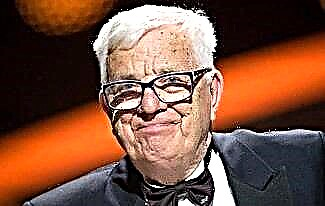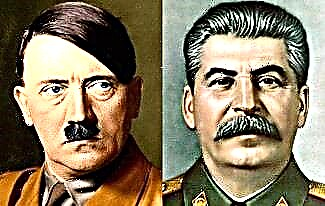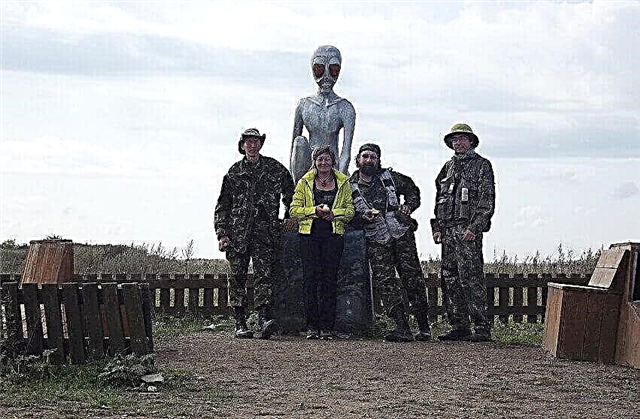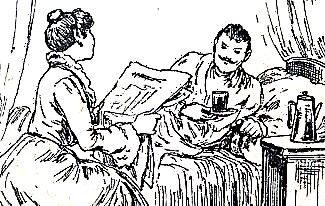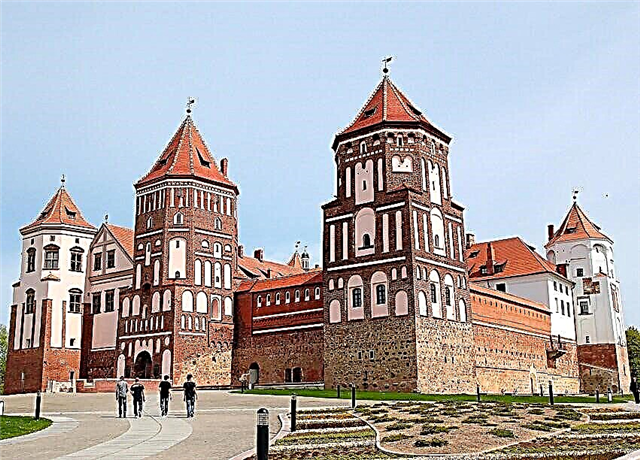The life of Alexander Odoevsky (1802 - 1839), which was not too long, even for the 19th century, contained many events, most of which were unpleasant, and some were completely disasters. At the same time, the young talented poet made, in fact, only one big mistake, joining the so-called Northern Society. This society, which consisted mainly of young officers, was preparing to carry out a democratic revolution in Russia. The coup attempt was made on December 18, 1825, and its participants were called Decembrists.

Odoevsky was only 22 years old at the time of joining the society. He, of course, shared democratic ideas, but in the broadest sense of this concept, like all Decembrists. Later, M. Ye. Saltykov-Shchedrin aptly characterizes these ideas as “I wanted either a constitution, or sevryuzhin with horseradish”. Alexander was in the wrong place at the right time. If he had not gone to the meeting of the Northern Society, Russia would have received a poet, perhaps only slightly inferior in talent to Pushkin.
Instead of a poet, Russia received a convict. Odoevsky spent a third of his life behind bars. He wrote poetry there too, but captivity does not help everyone to reveal their talents. And upon his return from exile, Alexander was crippled by the death of his father - he survived his parent by only 4 months.
1. Believe in it now it is rather difficult, but the big name of the princes Odoevsky (with an emphasis on the second "o") really comes from the name of the current urban-type settlement Odoev, located in the western part of the Tula region. In the XIII-XV centuries, Odoev, which now officially has a population of 5.5 thousand people, was the capital of the border principality. Semyon Yuryevich Odoevsky (Alexander's ancestor in 11 generations) traced his ancestry from the distant descendants of Rurik, and under Ivan III came under the arm of Moscow from the Grand Duchy of Lithuania. They began to collect Russian lands from the present Tula region ...
2. Among the ancestors of A. Odoevsky were the prominent oprichnik Nikita Odoevsky, who was executed by Ivan the Terrible, the Novgorod voivode Yuri Odoevsky, the actual privy councilor and senator Ivan Odoevsky. The writer, philosopher and teacher Vladimir Odoevsky was Alexander's cousin. It was on Vladimir that the Odoevsky family died. The title was transferred to the head of the palace administration, Nikolai Maslov, who was the son of Princess Odoevsky, however, the royal manager did not leave offspring either.
3. Alexander's father made a classic military career for a nobleman of those years. He entered military service at the age of 7, at less than 10 he became a sergeant of the Life Guards of the Semyonovsky regiment, at 13 he received the rank of ensign, at 20 he became captain and adjutant of Prince Grigory Potemkin. For the capture of Ishmael he received a specially established cross. This meant, if not disgrace, then a loss of disposition - in those years aide-de-camp received crosses or steps with diamonds, thousands of rubles, hundreds of serfs' souls, and then a cross, which was almost universally given to all officers. Ivan Odoevsky is transferred to the Sofia regiment and begins to fight. For the battle at Brest-Litovsk, he receives a golden sword. A. Suvorov commanded there, so the sword must be deserved. Twice, already in the rank of major general, I. Odoevsky resigns and twice he is returned to service. The third time, he returns himself, leading an infantry regiment of the militia in the war against Napoleon. He reached Paris and finally resigned.
4. Education Sasha Odoevsky received at home. Parents doted on the rather late first-born (when the son was born, Ivan Sergeevich was 33 years old, and Praskovya Alexandrovna was 32), the souls and especially teachers were not controlled, confining themselves to assurances of the boy's diligence, especially since he successfully mastered both languages and exact sciences.
5. Time will show that he was even more successful in assimilating the judgments of the history teacher Konstantin Arseniev and the French teacher Jean-Marie Chopin (by the way, the secretary of the Chancellor of the Russian Empire, Prince Kurakin). During the lessons, a couple explained to Alexander how harmful the eternal Russian slavery and despotism are, how they hold back the development of sciences, society and literature. It's another matter in France! And the boy's desk books were the works of Voltaire and Rousseau. A little later, Arsenyev secretly gave Alexander his own book "Inscription of Statistics". The main idea of the book was “perfect, unlimited freedom”.
6. At the age of 13, Alexander became a clerk (with the assignment of the rank of collegiate registrar), neither more nor less, but in the Cabinet (personal secretariat) of His Majesty. Three years later, without appearing at the service, the young man became the provincial secretary. This rank corresponded to a lieutenant in ordinary army units, an ensign or cornet in the guard and a midshipman in the navy. However, when Odoevsky left the civil service (without actually working a single day) and entered the guard, he had to serve the cornet again. It took him two years.

Alexander Odoevsky in 1823
7. The writer Alexander Bestuzhev introduced Odoevsky to the society of the Decembrists. Alexander Griboyedov's cousin and namesake, knowing well the fervor of a relative, tried to warn him, but in vain. Griboyedov, by the way, was also entirely for progress, but the progress was thoughtful and moderate. His statement about a hundred warrant officers trying to change the state structure of Russia is widely known. Griboyedov called the future Decembrists fools in person. But Odoevsky did not listen to the words of an older relative (the author of Woe from Wit was 7 years older).
8. There is no evidence of Odoevsky's poetic gift before the Decembrist uprising. It is only known that he wrote poetry for sure. Oral testimonies of several people remained at least about two poems. In a poem about the flood of 1824, the poet expressed regret that the water did not destroy the entire royal family, along the way describing this family in very ominous colors. The second poem was included in the case file against Odoevsky. It was called "Lifeless City" and was signed by a pseudonym. Nicholas I asked Prince Sergei Trubetskoy if the signature under the poem was correct. Trubetskoy immediately "split open", and the tsar ordered to burn the leaf with the verse.

One of Odoevsky's letters with a poem
9. Odoevsky took possession of a considerable estate of his deceased mother in the Yaroslavl province, that is, he was financially well off. He rented a huge house next to the Horse Guards Manege. The house was so large that, according to Alexander, the uncle (servant) sometimes could not find it in the morning and wandered around the rooms, calling out to the ward. As soon as Odoevsky joined the conspirators, they began to gather in his house. And Bestuzhev moved to Odoevsky on a permanent basis.
10. Father, not really knowing anything about participation in a secret society, apparently felt that his son was in danger, with his heart. In 1825, he sent Alexander several angry letters urging him to come to the Nikolaevskoye estate. The prudent father in his letters reproached his son exclusively for frivolity and frivolity. Later it turned out that uncle Nikita timely informed Ivan Sergeevich not only about Odoevsky Jr.'s affair with a married woman (only the initials are known about her - V.N.T.) - but also about speeches in Alexander's house. It is characteristic that the son, who was about to crush tyrants and overthrow the autocracy, was afraid of his father's wrath.
11. On December 13, 1825, Alexander Odoevsky could well have solved the issue of eliminating Nicholas I without any uprising. It fell to him to be on duty for a day in the Winter Palace. By separating the soldiers to change the sentries, he even disturbed the tsar's sensitive sleep - Nicholas had just received a denunciation by Yakov Rostovtsev about the uprising impending the next morning. During the investigation, Nikolai remembered Odoevsky. It is unlikely that he experienced any kind feelings for the young cornet - his life was almost literally at the tip of Alexander's sword.

Changing of the guard at the Winter Palace
12. Odoevsky spent the whole day on December 14 at Senatskaya, having received a platoon of the Moscow regiment under command. He did not run when the guns hit the rebels, but led the soldiers during an attempt to line up in a column and head towards the Peter and Paul Fortress. Only when the cannonballs damaged the ice and it began to fall under the weight of the soldiers, Odoevsky tried to escape.

13. The escape of Odoevsky was so poorly prepared that Alexander could well have left the Tsar's investigators without part of their enormous work. He took clothes and money from friends, intending to walk on the ice to Krasnoe Selo at night. However, getting lost and almost drowning, the prince returned to Petersburg to his uncle D. Lansky. He took the unconscious young man to the police and persuaded Chief of Police A. Shulgin to issue a confession for Odoevsky.
14. During interrogations, Odoevsky behaved in the same way as most of the Decembrists - he willingly talked about others, and explained his actions by clouding of his mind, fever and fatigue after 24 hours of duty in the Winter Palace.
15. Nicholas I, who attended one of the first interrogations, was so annoyed with Alexander's testimony that he began to reproach him with belonging to one of the oldest and most noble families of the empire. However, the tsar quickly came to his senses and ordered to take the arrested person away, but this philippic did not make any impact on Odoevsky.

Nicholas I first took part in interrogations himself and was horrified by the scope of the conspiracy
16. Ivan Sergeevich Odoevsky, like relatives of other participants in the uprising, wrote a letter to Nicholas I asking for mercy to his son. This letter was written with great dignity. The father asked to give him the opportunity to re-educate his son.
17. A. Odoevsky himself wrote to the Tsar himself. His letter does not look like repentance. In the main part of the message, he first says that he said too much during interrogations, voicing even his own guesses. Then, contradicting himself, Odoyevsky declares that he can share some more information. Nikolai imposed a resolution: "Let him write, I have no time to see him."
18. In the ravelin of the Peter and Paul Fortress, Odoevsky fell into a depression. No wonder: the older comrades were engaged in conspiracies, some from 1821, and some from 1819. For several years, you can somehow accustom yourself to the idea that everything will be revealed, and then the conspirators will have a hard time. And comrades "with experience", the notorious heroes of 1812 (among the Decembrists, contrary to popular belief, there were very few, about 20%), as can be seen from the interrogation protocols, did not hesitate to alleviate their lot by slandering accomplices, and even more so, soldier.

Camera in the Peter and Paul Fortress
19. In the Peter and Paul Fortress, Odoevsky was in a cell located between the cells of Kondraty Ryleyev and Nikolai Bestuzhev. The Decembrists were tapping with might and main through the adjacent walls, but nothing happened with the cornet. Either from joy, or from anger, hearing a knock on the wall, he began to jump around the cell, stomp and knock on all the walls. Bestuzhev diplomatically wrote in his memoirs that Odoevsky did not know the Russian alphabet - a very frequent case among nobles. However, Odoevsky spoke and wrote Russian very well. Most likely, his riot was due to deep despair. And Alexander can be understood: a week ago, you made posts at the royal bedroom, and now you are waiting for the gallows or the chopping block. In Russia, the punishment for malicious intent against the person of the emperor did not shine with variety. The members of the investigating commission in the protocol mentioned his damaged mind and that it is impossible to rely on his testimony ...
20. With the verdict, Alexander, and indeed all the Decembrists, except for the five hanged, were frankly lucky. The rebels, with weapons in their hands, opposed the legitimate emperor, were spared their lives. They were only sentenced to death, but Nikolai immediately commuted all sentences. The hanged men too - they were sentenced to quartering. Odoevsky was sentenced to the last, 4th category. He received 12 years in hard labor and indefinite exile in Siberia. A little later, the term was reduced to 8 years. In total, counting with exile, he served a sentence of 10 years.
21. On December 3, 1828, Alexander Griboyedov, preparing to set off on his fateful journey to Tehran, wrote a letter to the commander-in-chief of the Russian army in the Caucasus and, in fact, to the second person in the state, Count Ivan Paskevich. In a letter to the husband of his cousin, Griboyedov asked Paskevich to take part in the fate of Alexander Odoevsky. The tone of the letter was like the last request of a dying man. Griboyedov died on January 30, 1829. Odoevsky survived him by 10 years.

Alexander Griboyedov took care of his cousin until his last days
22. Odoevsky was taken to hard labor (ordinary convicts walked on foot) at public expense. The journey from St. Petersburg to Chita took 50 days. Alexander and his three companions, the Belyaev brothers and Mikhail Naryshkin, arrived in Chita as the last of 55 prisoners. A new prison was specially built for them.

Chita prison
23. Hard labor in the warm season consisted in the improvement of the prison: the convicts dug drainage ditches, strengthened the palisade, repaired roads, etc. There were no production standards. In winter, the norms were. Prisoners were required to grind flour with hand mills for 5 hours a day. The rest of the time, the prisoners were free to talk, play musical instruments, read or write. 11 wives came to the lucky ones. Odoevsky dedicated a special poem to them, in which he called the voluntarily exiled women angels. In general, in prison, he wrote many poems, but only some of the works he dared to give to read and copy to his comrades. Another occupation of Alexander was teaching Russian to his comrades.

Common room in Chita prison
24. The poem for which Odoevsky is famous was written in one night. The exact date of writing is unknown. It is known that it was written as a response to the poem by Alexander Pushkin “October 19, 1828” (In the depths of Siberian ores ...). The letter was delivered to Chita and forwarded through Alexandrina Muravyova in the winter of 1828-1829. The Decembrists instructed Alexander to write an answer. They say that poets write badly to order. In the case of the poem "Strings of prophetic fiery sounds ...", which became the answer to Pushkin, this opinion is incorrect. The lines, not devoid of shortcomings, became one of the best, if not the best, works of Odoevsky.
25. In 1830, Odoevsky, along with other inhabitants of the Chita prison, was transferred to the Petrovsky plant - a large settlement in Transbaikalia. Here the convicts were also not burdened with work, so Alexander, in addition to poetry, was also engaged in history. He was inspired by the literary press sent from St. Petersburg - his poems were published anonymously in the Literaturnaya Gazeta and Severnaya Beele, sent back from Chita through Maria Volkonskaya.

Petrovsky plant
26. Two years later, Alexander was sent to settle in the village of Thelma. From here, under pressure from his father and Governor-General of Eastern Siberia A.S. Lavinsky, who was a distant relative of Odoyevsky, wrote a letter of repentance to the emperor. Lavinsky attached a positive characterization to it. But the papers had the opposite effect - Nicholas I not only did not pardon Odoyevsky, but was also indignant that he lived in a civilized place - there was a large factory in Thelma. Alexander was sent to the village of Elan, near Irkutsk.

A. Lavinsky and Odoevsky did not help, and he himself received an official penalty
27. In Elan, despite the deteriorating state of health, Odoyevsky turned around: he bought and arranged a house, started (with the help of local peasants, of course) a vegetable garden and livestock, for which he ordered a lot of various agricultural machinery. For a year he has collected an excellent library. But in the third year of his free life, he again had to move, this time to Ishim.There was no need to settle down there - in 1837 the emperor replaced Odoevsky's exile with service as a private in the troops in the Caucasus.
28. Arriving in the Caucasus, Odoevsky met and made friends with Mikhail Lermontov. Alexander, although he was formally a private of the 4th battalion of the Tengin regiment, lived, ate and communicated with the officers. At the same time, he did not hide from the bullets of the highlanders, which earned the respect of his comrades in arms.

Portrait painted by Lermontov
29. On April 6, 1839, Ivan Sergeevich Odoevsky died. The news of the death of his father made a deafening impression on Alexander. The officers even set surveillance on him to prevent him from committing suicide. Odoevsky stopped joking and writing poetry. When the regiment was taken to the construction of fortifications in Fort Lazarevsky, soldiers and officers began to suffer from fever en masse. Odoevsky also fell ill. On August 15, 1839, he asked a friend to lift him up in bed. As soon as he did this, Alexander lost consciousness and died a minute later.
30. Alexander Odoevsky was buried outside the walls of the fort, on the very coastal slope. Unfortunately, the next year, Russian troops left the coast, and the fort was captured and burned by the highlanders. They also destroyed the graves of Russian soldiers, including the grave of Odoevsky. 

